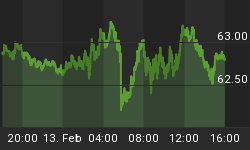On February 29, 2012, the European Central Bank (ECB) lent €529 to European banks, most of it, in three-year loans. This was the second such operation, launched with another mind-numbing acronym: LTRO (long-term financing operation). In the first LTRO (December 2011), €489 was lent to European banks. In the February 29, 2012, operation, 800 banks borrowed. According to the Financial Times, "broader collateral rules drew in smaller banks."
In the spring of 2011, the number of securities accepted by the ECB as acceptable collateral for loans to European banks was expanded from 19,000 to over 28,000. That was a desperation maneuver to save the euro. Since, the ECB has expanded the collateral list at least twice. Leading up to the latest LTRO, the ECB added over €7 trillion of previously forbidden collateral - that is, €7 trillion, if one accepts the value at which this nuclear waste was carried on European bank balance sheets. Now, it sits on the ECB's balance sheet, which has risen to €3.02 trillion ($3.96 trillion), 30% larger than the Federal Reserve's Pandora's Box.
In this entirely fraudulent paper chase, the banks that borrowed LTRO money put some of it to work in sovereign carry trades. The banks have borrowed at 0.25% from the ECB and are buying sovereign bonds with much higher yields. Intesa Sanpaolo SpA received €24 billion and "said they would use part of the cash to buy Italian sovereign bonds. Bank Civica SA did the same with Spanish sovereign bonds." Italian 10-year bond yields fell on February 29 from 5.33% to 5.17%. Spanish 10-years fell from 5.03% to 4.98%. Interestingly, Portuguese 5-years rose from 15.75% to 16. 54% on the same day, which may indicate the next default.
Market commentators are saying how well the LTRO worked: their proof being lower sovereign bond yields, which show "market participants have been reassured the Euro Project is back on track." (This is not a single, direct quote, but the form in which dozens of market commentators have reassured the banks that employ them of their added value.) There is some truth to that claim. The euro bureaucrats will do anything to prevent the euro's failure. Deceptions such as the LTRO may reassure market participants, even though the additional debt burden (that will not produce a single gumball) sinks Europeans into a deeper crypt.
It should be understood that the LTRO produced nothing other than more finance and inflation. (Gasoline in Europe now costs 9% more than in 2008. Andy Lees (AML Macro Limited) estimates that, converted into U.S. dollars, gas now costs $9.65 a gallon in Europe.) European businesses and the little people are not target audiences.
The Eurocrats continue to dine well in Brussels while adding another layer of debt under which their vassals are crushed. Returning to a long-term theme here, trustworthy collateral in proportion to the stated value of paper assets continues to fall. When the world once again understands the importance of collateral in relation to the worth of the paper it is printed on, the price of trusted collateral will soar.
Frederick Sheehan writes a blog at www.aucontrarian.com

















